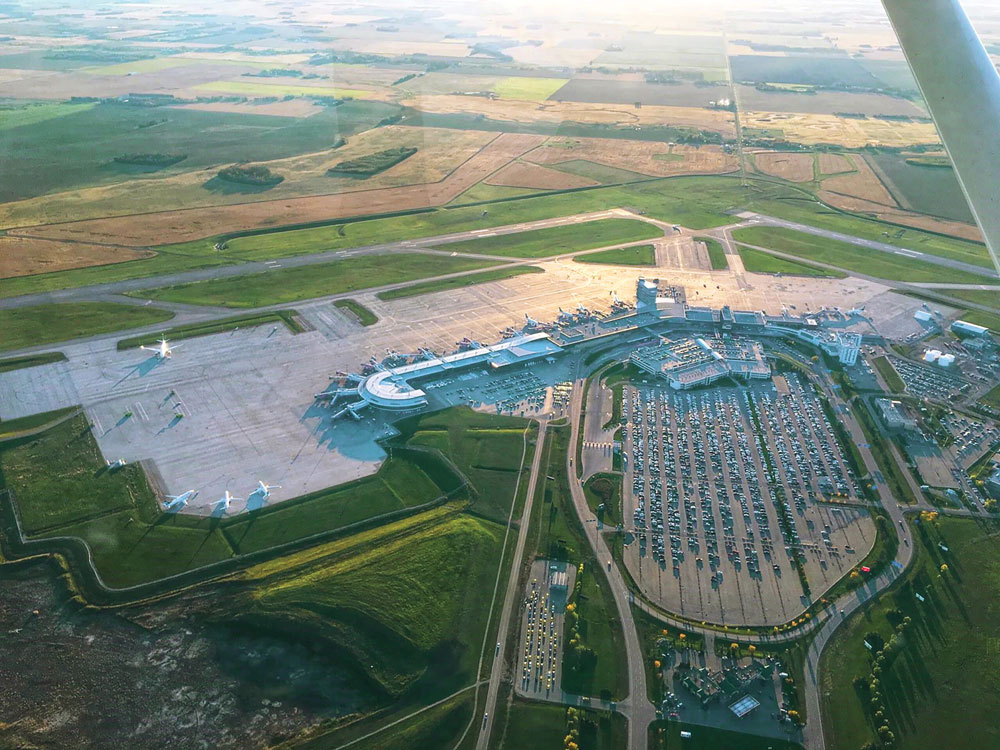The Leduc/Nisku Region in Alberta is one of those peripheral communities with enough momentum they don’t feel so peripheral anymore.
The region includes Leduc County with the City of Leduc and the Edmonton International Airport within those boundaries. Situated immediately south of the City of Edmonton, the region is known best as the site of Leduc No. 1, the oil well that changed the course of Alberta history. But it’s QEII, the north-south provincial highway connecting to the U.S. and Mexico and named for Queen Elizabeth II, that plays a major role in the region’s current and future economy.
The region is also home to Leduc Nisku Business Park, the second largest manufacturing industrial park in North America and the largest in Canada. In a world where time is money, the Leduc Region also is helped by a location much closer than Edmonton proper on the three-hour drive to Alberta’s other major city.
“A lot of groups prefer to be in Nisku because it’s 20 minutes closer to Calgary,” says Andrew Rudzitis, director of customer solutions for York Realty, the largest privately held industrial real estate landlord in Alberta. “That’s quite a big difference compared to northwest Edmonton.”
Cyril Harry, manager of real estate development for Edmonton International Airport (YEG), says the airport’s 7,000-acre Airport City Sustainability Campus has attracted C$1.5 billion in investment over the past decade. YEG is the largest airport by land mass in all of Canada and the fifth busiest by passenger count (7.9 million in 2024), with an overall economic output (including their general aviation airport in Villeneuve, northwest of Edmonton) of $5.3 billion. That figure will only climb with the advent of the International Cargo Hub (ICH).
Phase 1 of ICH is a $300 million project with $100 million grant funding from the Canadian government to begin the development of 2,000 acres of land that Harry says “will serve as a vital trade corridor for Canada and position our country’s leadership in global supply chains by helping capitalize on the rapid global growth of e-commerce and import/export fulfillment.”
The advantages of doing business at YEG begin with the fact that both Leduc County and the City of Leduc have competitive non-residential tax rates. After that, ease of doing business kicks in.
“With us you can look into long-term leases,” Harry says. “Instead of a high up-front capital cost, you can acquire the land, construct your building and we can work with you on what the structure of those long-term leases looks like. There is flexibility in lot sizes too. We have an internal permitting process for development and construction permits, working closely with our host municipality Leduc County to expedite approvals. As an example we have had large-scale developments permitting in 30 days, allowing developers to deploy capital very quickly.”
One other competitive advantage? It’s a 24/7 airport with no curfew. “Cargo flights can land at night,” Harry says, and soon will be able to fuel up more quickly thanks to a hydrant fueling project.
YEG, thanks to a partnership with Leduc County and the City of Leduc, is the first airport in Canada to launch commercial drone cargo delivery trials, with landing locations in the city and the county. This pilot project has implications for the medical industry and cargo delivery to remote communities.
Meanwhile, the airport is inextricably tied to its surrounding road system and its ties to that CANAMEX highway. “The QEII and 65th Avenue Interchange project is a joint effort between the City of Leduc, Alberta Transportation and the Edmonton Regional Airports Authority,” says Tara de Munnik, manager of economic development for the City of Leduc. She says the $112 million interchange, funded by the province and the City of Leduc, is expected to open later this year, on schedule and on budget. “It will support tremendous growth and development in the City of Leduc, Edmonton Metro Region, as well as provincially and nationally.” The city saw its population grow by 9.2% between 2019 and 2023.
Among other benefits, Harry says, the project will allow for separation of currently mixed logistics and passenger traffic, something sure to please the plethora of operators at YEG that include DHL, Purolator, CargoJet, FedEx, Rosenau Transport and BBE.
The interchange also will herald the creation of Leduc Landing Business Park, which will feature a mix of commercial, aero-employment and light industrial lands, as well as an accompanying residential growth zone.
Growth Comes Natural in Agri-Food Capital
The region has historically been rich not only in oil and gas but also food and agriculture. One homegrown success story is Little Potato Company, which York Realty just helped move into a larger facility at north Nisku Business Park.
Sprouting up near Little Potato Company’s facility, says Bryanna Kumpula-Yung, economic development coordinator for Leduc County, is an entire cluster of food companies in northern Nisku that are taking advantage of the area’s logistics prowess as much as its fields and factories. They also like being close to the Alberta Food Processing Development Centre, a provincial development center in the City of Leduc that has been helping the value-added food processing industry bring ideas to market for more than 40 years, including recent expansions by Siwin Foods and Groundswell Food Group
Why have so many of them invested on the south side of 41st Avenue, the boundary line where Leduc County begins? Lower taxes. But then there’s the energy that comes from a cluster itself.

Among its other attributes, Edmonton International Airport is the largest airport by land mass in Canada with 7,000 acres on its Airport City Sustainability Campus.
Photos courtesy of YEG
“Where we try and bridge the gap is we have small startups getting into the food business looking to scale up,” says the county’s Kumpula-Yung. “We can further support by helping them find space, connect them to the larger food processors and get them out to a larger market.”
York Realty’s Andrew Rudzitis sees the region’s strong mix of manufacturing and logistics uses reflected in the real estate, with a rise in multi-tenant facilities. “You might have a logistics company adjacent to a welding company,” he says. Proximity to the QEII and YEG is a driving factor, he says, but the biggest of all is property taxes, which are the lowest in Greater Edmonton. That fact, plus lower basic rents and land prices, is pulling occupiers into the county, among them Quest Ceiling Solutions, which just moved into York’s nearly fully leased Pioneer Skies Business Park.
Other counties in the region do well, Rudzitis says, but none have built up to the same scale as Leduc thanks to low taxes, geography, the airport and one other thing: “They’ve never wavered on getting permits through the door fast.”
Indeed, the City of Leduc zeroes in on efficiency, offering permit turnaround times that averaged 3.2 days in 2024. “Leduc has always been a forward-thinking, business-centered community that fosters entrepreneurship. This attitude has not changed, but what has changed is the way we support our business community,” says de Munnik.
Why stop there? An in-depth review of the city’s land use bylaw is currently underway and “will consider zoning changes to better allow us to meet our housing needs, develop parking and transportation strategies,” de Munnik says, “and make it easier to locate and build in Leduc.”
The City of Leduc’s new economic development strategy leverages Leduc’s strengths and identifies six priority sectors for growth: energy, advanced manufacturing, transportation and warehousing, hydrogen, value-added agriculture, and tourism.
“The feedback we received helped shape a strategy that truly reflects our community’s vision,” said Mayor Bob Young in the city’s annual report. “By focusing on high-potential sectors and ensuring we have the right infrastructure, workforce and business supports in place, we are setting Leduc up for long-term success.”
This Investment Profile has been produced under the auspices of Leduc County (leduccountybusiness.com), the City of Leduc (landinleduc.ca) and Edmonton International Airport (flyeia.com).

